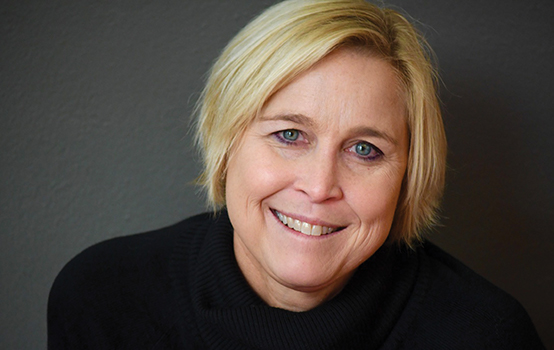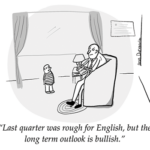Kappan’s editor talks with high school English teacher and researcher Lisa Scherff about the ongoing struggle over who gets to define the English language arts curriculum.
LISA SCHERFF(@lisascherff) teaches English and AP Research at South Fort Myers High School in Lee County, Fla. Previously, she was a professor of English education and teacher education at the University of Tennessee, the University of Alabama, and Florida State University.
Scherff’s research interests include teacher preparation and development, opportunity to learn in the English language arts, and student-teacher discussions of young adult literature. Her work has appeared in journals such as Research in the Teaching of English, Journal of Teacher Education, Journal of Adult & Adolescent Literacy, Journal of Literacy Research, and Teaching and Teacher Education. She has served in various roles with the National Council of Teachers of English, including as president of NCTE’s Alabama chapter and as coeditor of the journal English Education.
She is the author of Thirteen Years of School: What Students Really Think (Scarecrow Education, 2005), coauthor, with Susan Groenke, of Teaching YA Lit Through Differentiated Instruction (NCTE, 2010), and coeditor of a number of books, including The Future of English Teaching Worldwide: Celebrating 50 Years From the Dartmouth Conference (Routledge, 2018), International Perspectives on the Teaching of Literature in Schools: Global Principles and Practices (Routledge, 2017), and New Directions in Teaching English: Reimagining Teaching, Teacher Education, and Research (Rowman & Littlefield, 2015).
Scherff earned a master’s degree from the University of Mississippi and her bachelor’s degree and Ph.D. from Florida State University.
KAPPAN: You’ve had a quite varied career in English education: You teach high school but have also been a researcher and university professor. You’ve been very active with the National Council of Teachers of English (NCTE), including as a state chapter president and an editor of the journal English Education. You’ve published on a wide range of topics, edited a number of books . . . All of this is to say that within English education, you’ve worn a lot of different hats. So I’d like to ask you a question that can be answered in many different ways, depending on which hat you’re wearing at the moment: What is English?
More specifically, why has that question come up so many times over the years, appearing dozens of times in the title of articles, reports, and even books. Why do English teachers keep asking themselves “What is English?”
LISA SCHERFF: I think it stems mostly from the fact that as English teachers (and I’ll speak mainly to high school English, which is what I know best), we inherited a curriculum that we didn’t define, and which has always been in tension with how we hoped to teach and what we saw as the needs of our students. When high school English came together as a subject area, around the beginning of the 20th century, it was based mostly on the interests of college faculty. If you look at who participated in the 1894 Committee of Ten and other meetings to decide on the high school English curriculum, you see mostly university presidents and professors, and they focused on the things that mattered to them, such as college entrance requirements and the specific books they wanted students to have read before they got to campus.
But when classroom teachers and teacher educators met to discuss what English should be, the conversation looked very different. For example, on the NCTE website, you can find a brief report from 1911, describing a meeting of the National Education Association’s high school English Round Table (which then became NCTE). It was mostly high school teachers and teacher educators at this meeting, and they wanted to know what the curriculum should look like if teachers and students didn’t have to worry about college entrance requirements and reading lists. What should English be if it were defined by high school practitioners and not by college English professors?
KAPPAN: In other words, high school teachers and college professors have competed over who decides what English is?
SCHERFF: Not just college professors, though. Since the beginning, the question has always been whether you trust English teachers to define the curriculum, or should the curriculum be defined by other people, whether it’s college professors or textbook publishers or test developers or school boards or somebody else?
KAPPAN: If it were just up to English teachers, how would they define it?
SCHERFF: Often, you’ll hear people describe the English curriculum as a “tripod,” consisting of language, writing, and literature. We’ve always been concerned with teaching some combination of those three things. But it gets complicated, because if there’s tension between English teachers and other people over who gets to define English, there’s also plenty of tension among English teachers. For instance, are all three parts of the tripod equal? By “language,” people usually mean grammar, and in my experience not many teachers spend a lot of time teaching grammar any more. And while everybody says writing instruction is important, many English teachers have focused a lot more attention on reading literature than on writing. Plus, we’ve always disagreed about what kind of writing to teach — writing about literature? Argumentative essays? Journalism? Creative writing?
If English is a tripod, then the third leg of the stool — literature — has tended to be a lot bigger than the others. And that’s where we’ve also had the most tension over who decides what kind of instruction high school students need. Within English education, we’ve always had our own ideas about how to teach literature. For instance, Louise Rosenblatt had a lot of influence on high school teachers, starting in the late 1930s, with the idea that students should be taught to have a sort of conversation with literature — not just to understand poems and fiction but to respond to them.
But in the 1940s and ’50s, college English departments fell in love with the New Criticism, where the main point was to focus on the “close reading” of literature — it didn’t matter what a poem or story meant in its historical context, or what it made you think about, or how you might respond to it . . . you were supposed to dissect the text and understand what it meant and why it was an example of great literature. And pretty soon, there was a lot of pressure to make that the goal of high school English, too. It even made its way into standardized testing, where students get limited time to read a short passage, without any sort of context or background, and have to fill in bubbles to show that they’ve understood the meaning.
KAPPAN: But English teachers eventually reacted against that, right? For example, people often describe the 1966 Dartmouth Seminar as a turning point for the teaching of English. What happened there?
SCHERFF: At the time, there was a lot of concern about making sure American schools were keeping up with the Soviets, and the government was pushing for a more rigorous and systematic curriculum. The Carnegie Foundation gave some money to hold a high-level meeting at Dartmouth College to talk about the future of English as a subject area. It was a pretty small group. Maybe 50 people attended, including a delegation from the United Kingdom.
Since then, Dartmouth has been mythologized by some as this pivotal moment for English education. It’s often been said that the Americans arrived with a stodgy, traditional attitude about teaching a curriculum that focused on interpreting literature, but the British came in and presented a totally different and much more progressive approach, focusing on students’ “growth” through reading and writing. As they saw it, the point of high school English shouldn’t be to make students read a list of literary classics but to help them get better at using language.
KAPPAN: What influence did that have on English teaching in the U.S.?
SCHERFF: In the 1970s, the English curriculum did open up a lot. There was a lot more interest in teaching the other two parts of the tripod (writing and language) — for example, the National Writing Project took off, there was more teaching of the writing process, more creative writing, new approaches to grammar, and new respect for students’ home languages. The teaching of literature expanded, too, with more interest in multicultural literature, young adult literature, film and other media, readers’ personal responses to literature (though that sometimes went too far) . . .
I don’t know how much credit you can give to the British, though. When they talked about student growth, they weren’t really saying anything that hadn’t been said before, going back to Rosenblatt and John Dewey. Actually, what I learned from editing this new book about the Dartmouth Seminar is that it wasn’t the huge, landmark event it’s made out to be. For example, Jory Brass, one of the contributors to the book, argues that it was just a replay of the same old struggle over who gets to define the curriculum. It was 1911 all over again: English professors from elite universities wanted students to read certain books and meet certain standards, while high school teachers (from England, this time) argued that students need a broader curriculum that helps prepare them for life. The pendulum swings back and forth, you know. We keep trying to figure out what to do with these competing ideas about what English should be.
When high school English came together as a subject area, around the beginning of the 20th century, it was based mostly on the interests of college faculty.
KAPPAN: What about the recent battles over the Common Core English language arts (ELA) standards? Was that just another replay of the same struggle?
SCHERFF: When the Common Core standards were published in 2010, there was a lot of debate among English teachers about whether they should be adopted. At the time, Leslie Rush and I were the editors of English Education, and we decided we should write an editorial about the conflict. We published a chart that lays out the ELA standards, and we tried to show that none of it was new. Everything in the Common Core is stuff we’ve all been teaching for decades and decades under different names. (Of course, the Common Core assessments were a whole other issue.) Then we went on to argue pretty much the same thing that I’m saying in this interview, which is that the significance of the Common Core isn’t really about the curriculum — it’s about the politics of deciding what English is. Who controls the purse strings? Who has the grant money, and who has the influence? We’ve seen that play out through the funding of the Common Core assessments, the publishing of aligned textbooks, and the public relations efforts to get states to adopt them.
KAPPAN: So you would separate the Common Core standards from the politics that swirl around them?
SCHERFF: I do think you have to separate the standards themselves from all the other junk. The standards are fine. There’s nothing in them that strikes me as outlandish, or that isn’t consistent with what most English teachers hope their students will learn, including some fairly progressive goals for critical literacy.
The problem was how the Common Core was adopted and implemented, with very little involvement by teachers. It became another set of goals imposed on us from above. And then there were all these other things that were attached to them — suggested reading lists, for instance, which a lot of districts have treated as mandatory. Then there were the sample lessons on YouTube. The lead writer for the standards (David Coleman, who’s not a teacher) made a video showing how he would lead a close reading of the Gettysburg Address, but it wasn’t a lesson you would ever want to do with a real group of high school students. I would never spend this much time analyzing a tiny chunk of that speech, without even introducing students to the text and why it was important or connecting it to their lives or other texts.
But the biggest distortion of the standards had to do with the recommendation to have students read more nonfiction as they get older. The standards say it should be about a 70%-30% split between nonfiction and fiction across the curriculum. (And an aside, here: This is based on the proportion of test questions devoted to nonfiction and fiction in the National Assessment of Educational Progress, which really shouldn’t be what determines what we teach in high school.) A lot of school districts got the idea that the 70-30 split applied just to English. So pretty soon, English teachers were being told to teach history, including primary sources and documents they weren’t prepared to teach.
KAPPAN: Let me ask you to put on your teacher educator hat for a minute. You said that in the 1970s English teachers started to take more interest in teaching language and writing, not just literature. And more teachers began to shift from making students analyze literature to asking them to respond to what they read and to use language to develop their own ideas, communicate effectively, express themselves, argue, and so on. And if you look at the Common Core ELA standards, you see an effort to include those priorities.
But is that how new English teachers actually think about their work, or is it just the high-level NCTE version of what English should be? You’ve spent years working with aspiring English teachers. What do they think English is? Do they choose to go into the profession because they want to teach writing and argument and critical literacy, or do they think of themselves as future teachers of literature?
SCHERFF: I believe that most of the teacher candidates I encountered over the years decided to enter the profession because they love literature, some because they love writing. Often, they had a teacher who inspired them. Then there’s the influence of movies like Dangerous Minds and Freedom Writers — you know, the White savior mentality. But I would honestly say that everyone I encountered loves reading, loves writing poetry, loves some facet of English. And whatever their motivation, the best teacher education programs give them varied field experiences, diverse placements, and exposure to a number of approaches to teaching writing, literature, argument, critical literacy, and so on. And I hope candidates also get good professional development and good colleagues and mentors along the way.
A lot has changed over 15 years, though, given all the testing and accountability. Over the last few days, I’ve asked a lot of my colleagues about this, and their responses have been sobering. Just last night, a friend who teaches history said he doesn’t see students doing any deep reading anymore. He remembers reading Dante’s Inferno and The Canterbury Tales and other classics in school, which he loved, but now students tell him they’re assigned just to read short excerpts and pull out evidence to answer test questions. I talked to another colleague who has taught English for 15 years. In her district, she said, students are doing little to no extended writing, no process writing, no research papers. She’s convinced that only the Advanced Placement students are actually being prepared to succeed in college. Even in the honors classes, she’s made to teach canned assignments, which nobody enjoys.
I wouldn’t say the old NCTE/IRA standards (from 1996) were perfect, but I appreciated the intent behind them, which was to support teachers in planning lessons that would work for their students. The idea was to respect the teacher’s intelligence and agency. I used to assign writing portfolios. I used to assign creative writing. I used to do a lot of interesting stuff in class. But you should see the curriculum map I’m supposed to follow now. Everything is highly structured, down to the details of the lesson we’re supposed to teach on any given day. The district even gives us the essay topics students are supposed to write about. There’s little to no student choice. Plus, we’re one of the states that still has graduation exams, which tend to drive everything that we do. High school English has become totally focused on getting students to pass the exam.
Also, unless you were lucky enough to be grandfathered in, Florida has eliminated teacher tenure, so we’re all on annual contracts, and there’s a lot of fear-based compliance. If you live in a state where there are no high-stakes exams, and where teachers have more freedom to exercise their professional judgment, then students are probably getting a very different and much better experience in their English classes.
KAPPAN: Earlier, you pointed out that the struggle to control the English curriculum hasn’t been just high school teachers competing with college professors to decide what students need. Sometimes it’s the district or the state that tries to dictate what should go on in English class. It sounds like that’s where you are right now.
SCHERFF: Honestly, some of the things I’m being told to do are educational malpractice. For example, in my district (like others in the state I’ve heard about) we’re not supposed to teach any novels until after the high-stakes graduation exam. Depending on who you ask, that’s either an implicit guideline or an explicit rule. Either way, since students take the graduation exam at the beginning of May, it means that, technically, I’m prohibited from teaching a novel until the last three weeks of the school year. That’s the absolute truth. As an English teacher, I’m not supposed to assign my students to read a full-length novel. (I teach one anyway, but in the old days I would teach two or three per year.) I know teachers who are not teaching a novel at all this year, or who are only teaching excerpts from a Shakespeare play instead of the whole thing. (My classes are reading the full play.)
That puts another twist on the question, “What is English?” To me, it’s a complex subject area that includes all sorts of reading and writing — reading great novels and poems, stories, nonfiction, plays, and young adult fiction; studying classic movies, popular culture, and online texts; writing poems and stories, journalism, and essays; studying grammar, debate, argument, rhetoric . . . But to my district and state, English is a very narrow set of lessons and tested skills.
I understand why this is the case. Our schools are given grades, which are based mainly on students’ performance on high-stakes tests, so there’s a lot of pressure to constrain the curriculum. Once again, politics and policies from outside the classroom stand in tension with what we’d like to teach and what we know to be in the best interests of our students.
KAPPAN: It sounds like English teachers need some latitude to adapt and refine the curriculum during the school year, given the many kinds of reading and writing instruction you provide, and given the unpredictable ways in which classroom conversations can go.
SCHERFF: I think that’s a healthy process. I’ve heard it argued that the English language arts are, and should be, in a constant state of reinvention. And at the local level, we need some flexibility to choose fiction and nonfiction and projects and assignments that will make sense for our students. Where I live, though, people outside the classroom have short-circuited this process by defining the curriculum for us, down to the minute.
To my mind, teachers ought to think of the classroom as a laboratory, where we can constantly experiment with our teaching and curriculum and try to make it work better. If you have some academic freedom in your school, and if you have the resources you need, then you can keep that improvement cycle going. But if you’re held hostage by a lack of tenure and narrow pacing guides and mandated readings that you have to assign in a specific sequence, then it’s hard not to feel demoralized.
I hope the pendulum will swing back toward English teachers having more freedom to give students choices about what to read, assign more interesting writing projects, and adapt the curriculum in response to topics and questions that surface in the classroom. I mean the pendulum always does swing back, right? But my fear is that, in the meantime, we’ll lose a whole generation of students, who won’t be lifelong readers and who’ve been turned off to writing and reading and don’t have much intellectual stamina because they’re not being called on to read and write extensively about things that matter to them.
KAPPAN: Any reflections on returning to the high school classroom after spending years at the university level? After working in academia and research, and having edited books and professional journals, do you think differently about what it means to teach English?
SCHERFF: Compared to when I started out as an English teacher, I certainly have a much greater appreciation for academic freedom. Also, I suppose I care less now about teaching the “classics,” and I’m much more open to teaching young adult literature and other contemporary texts, like visual media, that meet my students’ interests. Given the realities of today’s job market and the importance of going on to higher education, I’m also a lot more interested in giving students real-world writing and speaking assignments and getting them to communicate with people in out-of-school contexts.
Overall, though, I don’t know that I’ve changed that much. I’ve always believed that English teachers should create a curriculum that takes students’ academic, social, and emotional needs into account, offers them choices of what to read and write about, and engages them in various genres and forms of literacy. I’ve always tried to use multiple measures of student learning, including classroom-based assessments to monitor student progress and guide instruction. And I’ve always seen English teaching as a way to promote social and educational equity, giving all students the tools they need to communicate effectively across a wide range of contexts.
Citation: Heller, R. (2019). What is English? Who decides? An interview with Lisa Scherff. Phi Delta Kappan, 100 (6), 45-49.
ABOUT THE AUTHOR

Rafael Heller
Rafael Heller is the former editor-in-chief of Kappan magazine.










